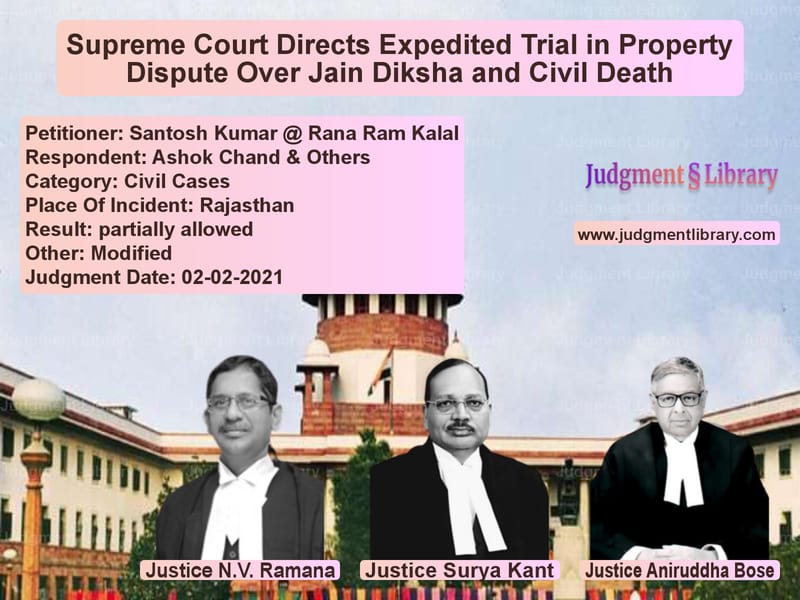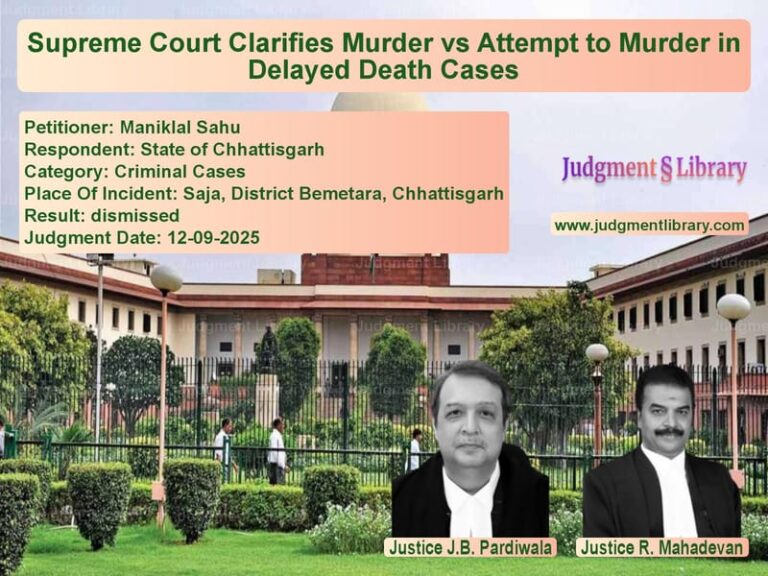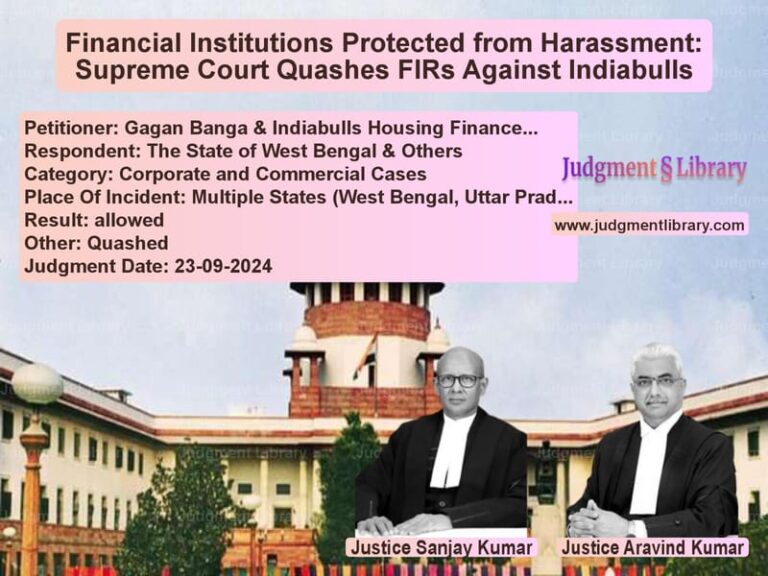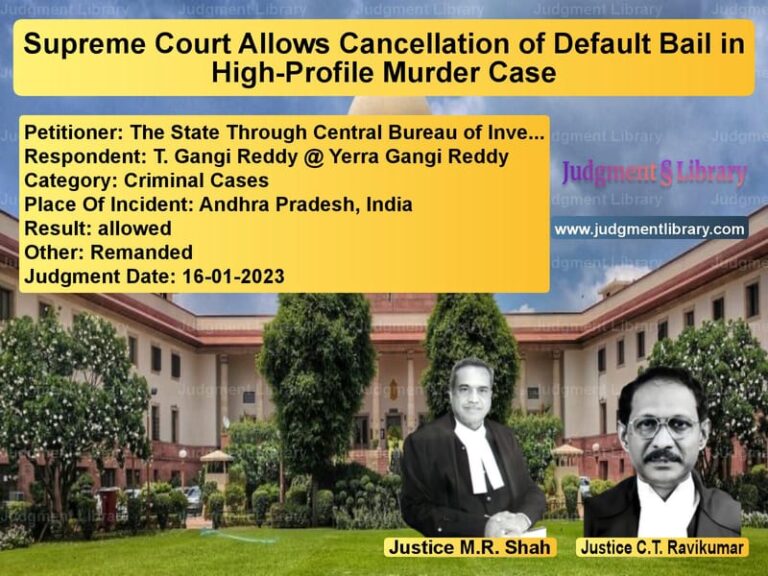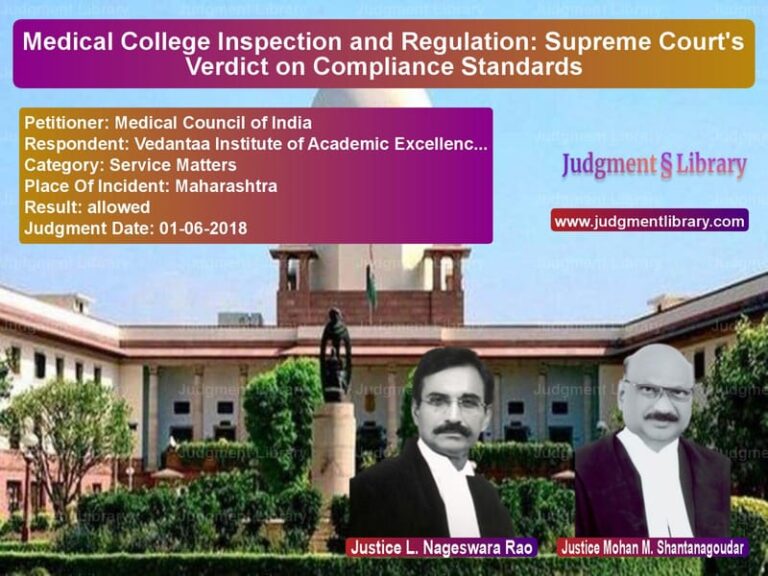Supreme Court Directs Expedited Trial in Property Dispute Over Jain Diksha and Civil Death
The Supreme Court of India recently ruled in Santosh Kumar @ Rana Ram Kalal vs. Ashok Chand & Others, resolving a legal battle concerning property ownership, the effect of Jain Diksha on inheritance rights, and procedural questions in civil suits. The Court upheld the Rajasthan High Court’s decision directing the trial court to decide preliminary legal issues before proceeding with the full trial.
Background of the Case
The case involved a property dispute filed by Santosh Kumar @ Rana Ram Kalal in 2007 in the trial court, seeking:
- Possession of the disputed property
- A declaration that he is the rightful owner
The defendants, Ashok Chand & Others, contested the claim and sought an early resolution of legal issues through a preliminary hearing.
The key legal issues raised in the case included:
- Whether the plaintiff had the legal right to claim possession and receive rent from tenants
- Whether the property sellers, Smt. Kanta Devi and Nikita, had suffered civil death after taking Jain Diksha, thereby rendering their sale deed invalid
- Whether the trial court had jurisdiction to hear the case
- Whether the suit was maintainable in law
Petitioner’s (Santosh Kumar @ Rana Ram Kalal) Arguments
The petitioner contended:
- The High Court erred in directing the trial court to decide preliminary legal issues separately instead of conducting a full trial.
- The issues raised involved both law and facts, requiring a complete trial with evidence before a final decision.
- The High Court’s order contained observations that could adversely affect the case’s outcome.
- The trial court had already ruled on May 19, 2009 that these issues required a full-fledged trial.
Respondent’s (Ashok Chand & Others) Arguments
The respondents, in defense, argued:
- The High Court’s directive was justified since the disputed legal questions determined the very maintainability of the suit.
- The plaintiff’s claim was based on a sale deed executed by two individuals who had taken Jain Diksha, thereby allegedly suffering civil death under Jain religious principles.
- The question of civil death was purely a legal matter, warranting a preliminary decision.
- The High Court did not pass any final judgment but merely directed the trial court to resolve fundamental legal issues first.
Supreme Court’s Observations
The Supreme Court bench, comprising Justices N.V. Ramana, Surya Kant, and Aniruddha Bose, analyzed the case and upheld the Rajasthan High Court’s ruling. Key observations included:
- The High Court correctly directed that the legal issues should be resolved first since they affected the maintainability of the suit.
- The plaintiff’s claim was based on documents executed by individuals whose legal capacity to transfer property was under question.
- “The High Court’s approach in directing the above framed issues to be decided as preliminary questions of law cannot be said to be incorrect.”
- The plaintiff failed to show any material to prove that the issues involved mixed questions of law and fact.
The Court emphasized:
“The trial court must decide the preliminary issues independently without being influenced by any observations in the High Court’s order.”
Final Judgment
The Supreme Court ruled:
- The Rajasthan High Court’s order dated March 15, 2010, was upheld.
- The trial court was directed to decide the legal issues expeditiously and without influence from the High Court’s prior observations.
- The stay on the High Court’s order, granted by the Supreme Court on May 7, 2010, was vacated.
- The trial court must dispose of the matter on its merits at the earliest opportunity.
Impact of the Judgment
This ruling has significant implications:
- Clarity on Preliminary Issue Hearings: The judgment reinforces that fundamental legal questions affecting case maintainability should be addressed first.
- Recognition of Civil Death Under Jain Diksha: The case establishes a framework for determining whether Jain religious renunciation affects legal rights.
- Efficient Case Management: The Supreme Court has directed faster resolution of procedural questions to prevent unnecessary trial delays.
- Jurisdictional Precedents: The ruling clarifies that trial courts must resolve jurisdiction and maintainability issues before proceeding with full trials.
Conclusion
The Supreme Court’s ruling in Santosh Kumar @ Rana Ram Kalal vs. Ashok Chand & Others establishes key precedents in civil procedure and property law. By upholding the Rajasthan High Court’s directive to decide preliminary legal issues first, the Court ensures efficient trial proceedings.
The judgment further sheds light on the legal consequences of Jain Diksha, providing clarity for similar disputes concerning religious renunciation and inheritance. This ruling strengthens procedural fairness while ensuring that critical legal questions are addressed at the outset of litigation.
Petitioner Name: Santosh Kumar @ Rana Ram Kalal.Respondent Name: Ashok Chand & Others.Judgment By: Justice N.V. Ramana, Justice Surya Kant, Justice Aniruddha Bose.Place Of Incident: Rajasthan.Judgment Date: 02-02-2021.
Don’t miss out on the full details! Download the complete judgment in PDF format below and gain valuable insights instantly!
Download Judgment: santosh-kumar-@-rana-vs-ashok-chand-&-others-supreme-court-of-india-judgment-dated-02-02-2021.pdf
Directly Download Judgment: Directly download this Judgment
See all petitions in Property Disputes
See all petitions in Succession and Wills
See all petitions in Specific Performance
See all petitions in Judgment by N.V. Ramana
See all petitions in Judgment by Surya Kant
See all petitions in Judgment by Aniruddha Bose
See all petitions in partially allowed
See all petitions in Modified
See all petitions in supreme court of India judgments February 2021
See all petitions in 2021 judgments
See all posts in Civil Cases Category
See all allowed petitions in Civil Cases Category
See all Dismissed petitions in Civil Cases Category
See all partially allowed petitions in Civil Cases Category

